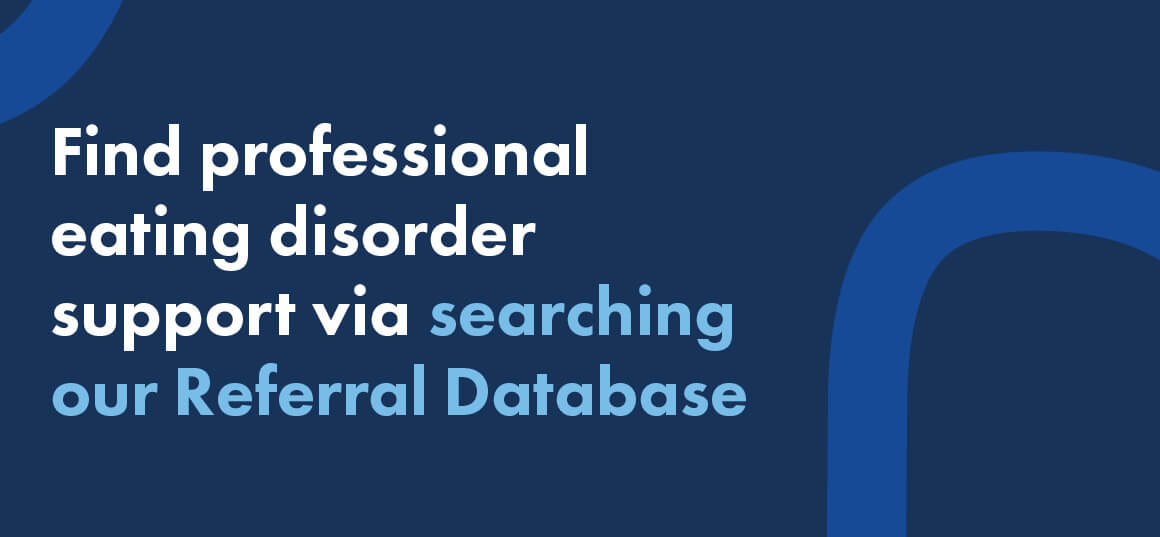About Medicare Eating Disorder Plans
Many people in Australia who are experiencing eating disorders are able to access recovery support through Medicare.
Known as an Eating Disorder Plan (EDP), it’s an evidence-based, best practice model of treatment. The plan can include up to 20 Medicare-subsidised sessions with a dietitian and 40 sessions with a mental health clinician over a 12-month period.
If you’re a clinician, or have specific questions, view the Frequently Asked Questions.
We have put together a quick guide to eating disorders and Medicare.
Only a GP – a psychiatrist or paediatrian (if you already have one) – can assess your eligibility.
According to the Medicare Benefits Scheduling Book (pg 182-195), you may be eligible for an Eating Disorder Plan if:
- You have a diagnosis of Anorexia Nervosa according to the DSM-5 (assessed by GP) OR
- You have a diagnosis of bulimia nervosa, binge eating disorder or other specified feeding or eating disorder (OSFED)
AND
- A Global EDE-Q score of 3 or higher
- Your condition is characterised by rapid weight loss, or frequent binge eating or inappropriate compensatory behaviour as manifested by 3 or more occurrences per week.
You will need at least 2 of the following factors to be eligible
- Clinically underweight with a body weight less than 85% of expected weight where weight loss is directly as a result of the eating disorder.
- Current or high risk of medical complications due to the eating disorder.
- One or more serious medical or psychological conditions (in addition to your eating disorder) significantly impacting on your health status and function, for example, diabetes, Obsessive Compulsive Disorder (OCD), depression, anxiety disorder, Crohn’s Disease.
- Overnight inpatient admission – that is, a hospital or treatment centre – for an eating disorder in the last 12 months.
- Inadequate treatment response to evidence-based eating disorder treatment over the past six months despite active and consistent participation.
1. You’ll get a set Medicare refund amount for up to 40 sessions of evidence-based psychological treatments, which are:
- Family Based Treatment for Eating Disorders (including whole family, Parent Based Therapy, parent only or separated therapy)
- Adolescent Focused Therapy for Eating Disorders
- Cognitive Behavioural Therapy (CBT) for Eating Disorders (CBT-ED)
- CBT-Anorexia Nervosa (AN) (CBT-AN)
- CBT for Bulimia Nervosa (BN) and Binge-eating Disorder (BED) (CBT-BN and CBT-BED)
- Specialist Supportive Clinical Management (SSCM) for Eating Disorders
- Maudsley Model of Anorexia Treatment in Adults (MANTRA)
- Interpersonal Therapy (IPT) for BN, and/or BED
- Dialectical Behavioural Therapy (DBT) for BN and/or BED
- Focal psychodynamic therapy for Eating Disorders.
2. Up to 20 sessions dietetic care
- Only reimbursed for 20 minute consultation
Contact our Helpline to find someone near you who offers these kinds of treatments, or search the InsideOut database
The amount of the refund varies depending on the practitioner, item numbers and where the consultation takes place.
Getting an Eating Disorder Plan
To be assessed for an Eating Disorder Plan (EDP), you can see a GP – it’s also possible to see a psychiatrist or paediatrician (if you already have one).
Finding a GP
If you don’t have a GP you trust, contact the Butterfly Foundation Helpline so we can check if there’s a GP in your area with an understanding of eating disorders. You can also search for pre-screened health professionals our online Referral Database, which is free and accessible at any time.
Some GPs may not be aware of the recent changes to the Medicare Benefits Scheme or the eligibility criteria. If not, you can refer them to the MBS Online Eating Disorders page.
Once you are ready to book an appointment with a GP, please be aware that to appropriately assess eligibility for an Eating Disorder Plan and to complete their referrals, your GP will need a longer consultation time with you. When booking your appointment you could mention that it is for a mental health assessment and to allocate enough time for your visit. Your GP may need more than one appointment to appropriately complete their assessment and referrals.
To get prepared, you can search the Eating Disorder Examination Questionnaire (EDE-Q) online to help you think about all the ways your experience of an eating disorder may be affecting you. The EDEQ is also part of the assessment for an Eating Disorder Plan.
You may also wish to select a practitioner before you see a GP, rather than being referred to someone suggested by the GP. To do so, you can:
- Contact the Helpline for practitioners who have gone through an assessment to ensure they have an understanding of eating disorders, or search the InsideOut database
- Consider contacting a few different practitioners to see who you feel most comfortable with, and check their pricing after the Medicare Reimbursement (ie; a psychologist might cost $140, and you will receive $101.35 back on the MBS). Remember to ask if they can offer a sliding scale pricing option if you are struggling to cover the remaining cost.
Express all the ways in which the disordered eating behaviours and thoughts are impacting your day to day life including how it is impacting you emotionally.
Share anything else in your life that is impacting you at the moment.
Remember that if you have an eating disorder diagnosis, it doesn’t matter what body size or weight you are – you are deserving of support and can still access an EDP by following the EDE-Q criteria. If you don’t fit the specific EDE-Q criteria, please still seek support via our National Helpline – you can call, use webchat, or email.
Make sure you talk to your GP on this first visit about a referral to a psychiatrist for the halfway review which is critical in gaining access to the final 20 sessions. This is important, as psychiatrists often have long waitlists – you can always cancel if you want to.
The GP decides you are eligible
After you are assessed, the GP will let you know if you are eligible for the EDP. You will then line up an appointment with your practitioner. There are a few more things to remember, especially considering that the treatment plan comes in 4 blocks of 10 sessions each – you will need to action some steps between these lots of 10 to ensure ongoing support.
The GP decides you aren’t eligible
We understand this might be difficult – remember there are other options:
- Get a second opinion, as the decision could vary with different practitioners.
- If you haven’t already, contact the Helpline to check if there are any GPs in your area that have specific eating disorder treatment knowledge and experience
- If you’re not eligible, you’re still able to access 6 – 10 sessions a year with a psychologist and 5 sessions with a dietitian.
- Contact our National Helpline to talk about your other options and to get support. We’re here for you!
Finding a Mental Health Practitioner for an Eating Disorder Plan
Finding the right practitioner is important to make sure you’re getting all the support you deserve. Here are some important points to consider:
Who Can I See for Support?
Mental Health Professionals who are registered with Medicare:
- Psychiatrists, Paediatricians, Clinical Psychologists, Psychologists, Dieticians
- Social Workers and Occupational Therapists must have special registration with Medicare where they prove 10 hours of specific professional development
You may need to contact the practitioner you are thinking of going with to ensure they are able to administer the therapeutic treatment.
The practitioner has to be delivering one of the following treatments;
- Family Based Treatment for Eating Disorders (EDs) (including whole family, Parent Based Therapy, parent only or separated therapy)
- Adolescent Focused Therapy for EDs
- Cognitive Behavioural Therapy (CBT) for EDs (CBT-E)
- CBT-Anorexia Nervosa (AN) (CBT-AN)
- CBT-Bulimia Nervosa (BN) and Binge-eating Disorder (BED) (CBT-BN and CBT-BED)
- Specialist Supportive Clinical Management (SSCM) for EDs
- Maudsley Model of Anorexia Treatment in Adults (MANTRA)
- Interpersonal Therapy for BN, BED
- Dialectical Behavioural Therapy for BN, BED
- Focal psychodynamic therapy for EDs
Helpful Tips
Find a practitioner before you go to your GP. Contact the Helpline for practitioners who have gone through an assessment to validate their specific experience of working with eating disorder treatment.
Maybe contact a few different practitioners to see who you feel most comfortable with, and check their pricing after the Medicare Reimbursement (ie; a psychologist might cost $140, and you will receive $101.35 back on the MBS). Remember to ask if they can offer a sliding scale pricing option if you are struggling to cover the remaining cost.
Next Steps
Ensuring your treatment continues.
- You will need to renew your sessions after your first 10 sessions with the practitioner. You can do this by visiting your GP again. You will not be able to attend more than 10 sessions if you do not first visit your GP.
- Either as a part of your first assessment visit, or as a part of this second renew visit, flag that you will need the referral to a psychiatrist and book in a date with someone which will fall somewhere between your 10th and 20th session with your practitioner. You might need to shuffle this around, but the important thing is to book it as there may be long waiting times!
- The psychiatrist will assess you for eligibility for the next 20 sessions. You will not need to go through the EDE-Q again – this is a general assessment when they will look at how well you are engaging in treatment, how often you’re going, and what the next steps are
- Your next GP visit will be after 30 sessions with your practitioner for your renewal for the final 10 sessions.
Frequently asked questions
If you’re a clinician or you’d just like more of the detail, please check out the Frequently Asked Questions.



















